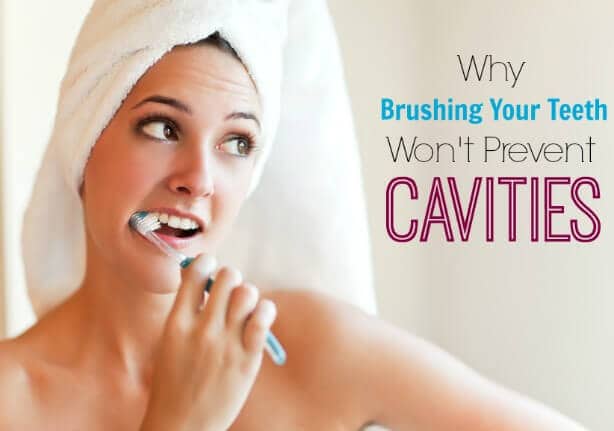Being married to a Brit, I’ve learned that Americans are relatively obsessed with dental hygiene. I don’t know about you, but as a child it was ingrained into me that if I ate too much sugar my teeth would rot and fall out, but if I brushed my teeth and went to the dentist twice per year for cleanings and nasty bubble gum-flavored fluoride treatments, there just may be hope of dental salvation.
Tooth decay has become commonplace and even expected. According to the National Institute of Health, 92% of adults in the U.S. have had cavities in their adult teeth. But did you know that many of our healthy, thriving ancestors often had perfect teeth without braces and no decay?
One man, Weston A. Price, a dentist who lived nearly a century ago traveled the globe to meet and study populations of native people who had not been exposed to modern foods and as a result had perfect teeth without decay. His work has influenced modern dental pioneers such as Ramiel Nagel, author of Cure Tooth Decay, that bring us the refreshing wisdom that we can prevent cavities and improve overall health with the diets more like our ancestors.
How do Cavities Happen?
It commonly understood that cavities occur when acids in your mouth break down enamel which is the hard protective layer on the outside of each tooth. According to this thinking, sugar makes cavities worse because the naturally occurring bacteria in your mouth breaks down the sugar and produce acid as a byproduct. Sugar + germs = acid which lead to cavities.
So brushing away the sugar and bacteria can help to keep your teeth from decaying.
Turns out, this isn’t quite accurate.
When I looked a bit deeper, I learned that too much sugar actually upsets the calcium to phosphorus ratio in the body, which in turn will cause calcium and other minerals to be leached from teeth and bones, weakening them. Even more importantly, eating specific nutrient-dense foods makes teeth stronger and healthier, sparing them from decay and disease.
Prevent Cavities with Food:
To this day, as I help my little ones brush we sing, “Every day we brush our teeth, brush our teeth, brush our teeth. Everyday we brush our teeth so we don’t get CAVITIEEEES!”
Despite our daily gleeful teeth cleanings, brushing and flossing has become a minor part of our dental health since I learned superior importance of the right diet.
Here’s are the general things you must do to improve your diet if you want to prevent cavities and even remineralize your teeth:
Optimize Food Absorption
In order to be able to properly digest and assimilate nutrients, it’s essential to have health digestive function. Probiotic-rich foods and possibly probiotic supplements play an important role in strengthening your body’s ability to digest food. Learn five easy ways to consume more probiotics in this post.
Gelatin found in bone broth or taken as a supplement can heal the digestive lining to improve poor absorption and/or food sensitivities.
Bone broth is simply a broth made from bones and leftover meat – the perfect base to the universal superfood – grandma’s chicken soup. It can be made from beef, lamb, pork, or fish too (the latter being especially good for teeth). Unlike store bought stock, homemade broth is loaded with nutritional goodies that are necessary for strong teeth and bones.
You can learn how to make bone broth with this easy tutorial. Make a big pot at one time and freeze by the quart or in ice cube trays. You can use it for quick soups and savory stews, pour it over meals in gravy, drink it warm or cold, or use it instead of water to cook your properly prepared grains or beans.
Reduce Mineral Leachers
Because sugar can upsets the body’s calcium to phosphorus ratio and weaken teeth, it’s best to limit all sweets – especially if you currently have cavities, and try to consume mostly mineral rich sweeteners like real maple syrup, raw honey, and unrefined cane sugar called sucanat.
It is important to eliminate or reduce grain consumption and/or prepare any grains you do eat via soaking, sprouting, or souring. This reduces the anti-nutrient, phytic acid which blocks mineral absorption in the body leading to weak bones and teeth. Because I’m often short on time, I tend to opt for white rice and store-bought bread that is traditionally soured or sprouted to reduce my family’s phytic acid intake.
Consume More Minerals
There are lots of opportunities to include more minerals in your diet naturally. Bone broth, discussed above, is one the easiest ways to infuse your body with essential minerals for healthy teeth.
A second way to get more minerals is by consuming plenty of unrefined sea salt. While conventional nutritionists encourage low-salt diets, this is not only unwarranted, but also unsafe. High quality sea salt is mineral rich and helps the body to maintain proper hydration as well. Read more about the health benefits of salt in this post.
Finally, seaweed, fish and shellfish (especially mussels, clams, and oysters) are very mineral-rich and delicious too.
Eat More Fat and Fat-Soluble Vitamins
Time to shake any fat-phobia because saturated fat and cholesterol from healthy, properly raised animals are essential to healthy teeth. These often shunned fats contain fat-soluble vitamins A, D, K, and E which are unavailable in vegetable sources.
The sources of these foods include dairy from grass fed animals, organs meat, and shellfish. Many of these foods seem odd to our modern tastes of simply eating muscle meats like chicken breast, flank steak, and filet of fish, but once you get used to the idea, they are both delicious and deeply nourishing.
In particular, the fat soluble vitamin essential to prevent cavities are:
Vitamin K2
This little-discussed, but very important fat-soluble vitamin that helps the body know where to put calcium (in the teeth and bones, rather than in lumps or stones). Vitamin K2 is found most abundantly in dairy products from cows raised on green pastures (the cows convert the K1 in the grass to K2 in their milk).
In addition to pasture-raised, choose raw dairy if possible (not pasteurized or homogenized). Raw milk, cream, butter, cheese, yogurt, etc will be loaded with calcium, vitamin D, vitamin K2, and other important nutrients, and since it is not pasteurized, the probiotic and enzyme content is not destroyed so the body will be able to assimilate those nutrients with more ease.
If you already have cavities or weak teeth or you don’t consume dairy regularly, you may want to consider taking a High Vitamin Butter Oil supplement which can provide concentrated quantities of K2. You can get butter oils supplements here.
Vitamin D
Vitamin D, commonly known as the sunshine vitamin, is best generated in the human body from regular sun exposure (15-20 minutes/day of direct sun in the equivalent of short-shorts and a tank top). In addition to a long list of functions, Vitamin D is essential to maintain a healthy ratio of phosphorus and calcium for healthy bones and teeth.
For those who do not or cannot get this much sun, the next best choice is to get vitamin D through food – including fermented cod liver oil (discussed below), fish roe, or lard from forage-fed hogs. You can read more about getting vitamin D from food and supplements in this post.
True Vitamin A
Vitamin A pairs up with vitamin D to stimulate and regulate bone growth and repair. Though we commonly are told that we can get vitamin A from carrots and other orange veggies and fruit, in reality, these foods contain carotenes which are often poorly converted to true vitamin A.
Many folks turn up their noses at the thought of eating liver, but when it comes from healthy animals, liver is one of the most nutrient dense foods on earth, providing us with more fat-soluble vitamins A and D than any other food.
My family consumes liver regularly by pureeing it and mixing it in with ground beef for everything from meatloaf to chili. Pate and sausages containing liver also are a hit – without the yuck factor.
If none of these foods are in your dietary realm of possibility right now, start with a fermented cod liver oil supplement like this one. Good quality cod liver oil provides essential omega 3 fatty acids as well as vitamins A and D, and is a supplement that would benefit nearly everyone to take whether or not you have liver on your plate.
A final option when it comes to consuming liver for dental health is to take dessicated liver pills, available here.
Learn more about how to prevent cavities:
For more information on preventing cavities, remineralizing teeth, and improving overall health, Cure Tooth Decay by Ramiel Nagel is an invaluable resource. In addition, choosing a toothpaste that contains ingredients to help strengthen the enamel and fight bacteria is also helpful.
 About the author: Emily Bartlett L.Ac. is the creative voice behind HolisticSquid.com. Like the mysterious creature that shoots and swirls through the ocean, she’s got her tentacles exploring many things: fertility, health, delicious, nourishing food, and whatever else blooms from her neo-hippy existence in Southern California. Go say hi!
About the author: Emily Bartlett L.Ac. is the creative voice behind HolisticSquid.com. Like the mysterious creature that shoots and swirls through the ocean, she’s got her tentacles exploring many things: fertility, health, delicious, nourishing food, and whatever else blooms from her neo-hippy existence in Southern California. Go say hi!This article was medically reviewed by Dr. Steven Lin, who is a Board accredited dentist trained at the University of Sydney. With a background in biomedical science, he is a passionate whole-health advocate, focusing on the link between nutrition and dental health. As always, this is not personal medical advice and we recommend that you talk with your doctor or dentist.
Have you prevented or healed cavities using diet? Share in the comments below!


Leave a Reply